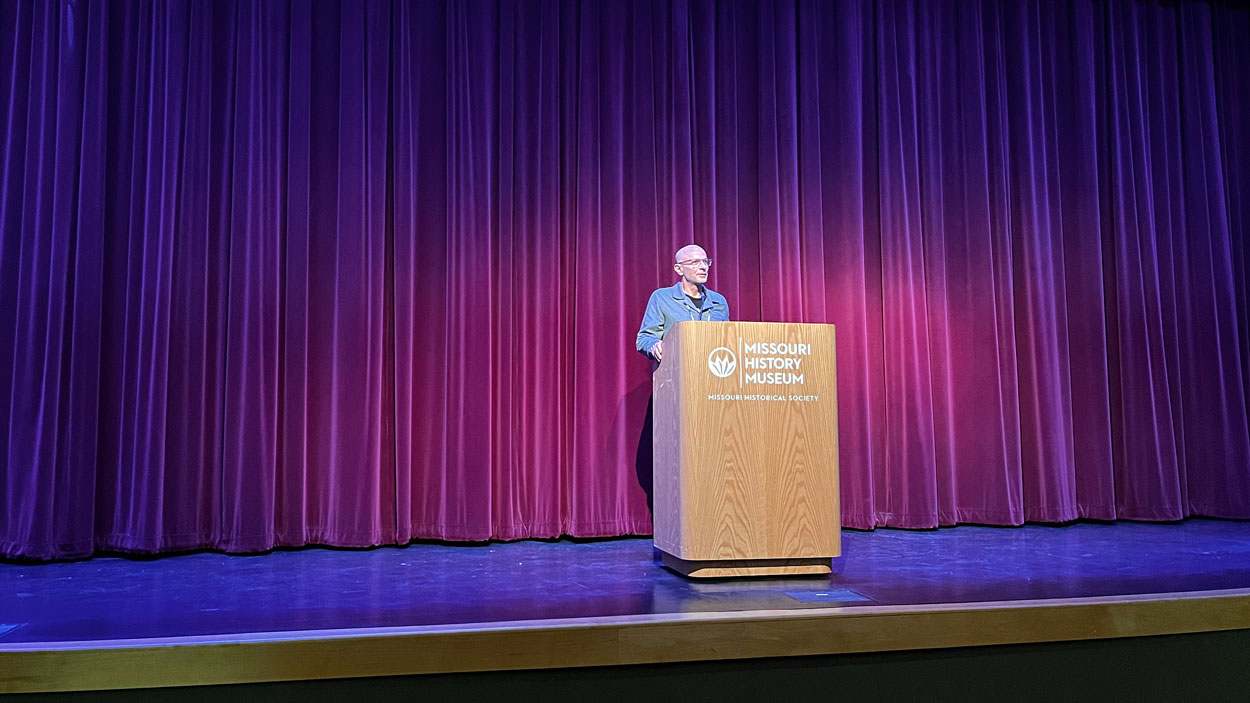
David Treuer is the author of “Rez Life: An Indian’s Journey Through Reservation Life” and “The Heartbeat of Wounded Knee.” He presented the 31st annual James Neal Primm Lecture, sponsored by UMSL’s Department of History, at the Missouri History Museum on April 4. (Photo by Heather Riske)
David Treuer doesn’t like to call himself a historian. For much of his life, the author – who completed his creative writing thesis under the direction of Toni Morrison – was content to be a novelist.
But the deadly 2005 school shooting at Red Lake Indian Reservation would change the trajectory of his career. For Treuer, a member of the Leech Lake Band of Ojibwe, the tragedy hit particularly close to home.
As he watched the tragedy unfold on national news, Treuer started to get angry, even yelling at his brother’s television at one point.
“I said, ‘They’re not reporting the news,’” he told the audience at the 31st annual James Neal Primm Lecture in History at the Missouri History Museum on April 4. “On almost every channel, on every website, every media source, it was more or less the same headline – ‘On a poor, remote reservation, tragedy strikes.’ That’s not the news; that’s just the same old sad story about reservations that everyone thinks is true.”
Later that week, Treuer shared his frustrations while meeting with an editor and wound up forming the basis for what would later become “Rez Life: An Indian’s Journey Through Reservation Life,” his first full-length work of nonfiction. The book examines life on Native American reservations and the role that casinos, tribal government and the Bureau of Indian Affairs have played in shaping this landscape.
Treuer reflected on his journey to storyteller, ethnographer and historian during his talk, “Beyond Tragedy: Imagining Native Futures,” as part of the Primm Lecture series sponsored by the Department of History at the University of Missouri–St. Louis.
The series, established in 1993, honors the legacy of Primm, who chaired the department at UMSL beginning with its founding in 1965. He was later named a Curators’ Professor of History in 1987 and was also a member of the board of the Missouri Historical Society. Primm died in 2009.
Treuer was the latest distinguished historian to share his work through the public lecture.
“His books are powerful,” said Professor Laura Westhoff, chair of the Department of History, in her introduction of Treuer. “They tackle difficult, complicated and also compelling and beautiful stories of people and a history that all of us in this room share by virtue of making our homes on the lands currently called the United States.”
Although Treuer vowed not to write nonfiction again after “Rez Life,” he felt like there was a bigger story to be told about Native past and present. When he was a sophomore in college in 1990, he finally got around to reading Dee Brown’s bestselling “Bury My Heart at Wounded Knee,” which culminates in the devastating Wounded Knee Massacre of 1890. Brown argued that “the culture and civilization of the American Indian was destroyed” at this time, detailing the “hopelessness, poverty and squalor” found at contemporary reservations. That picture didn’t represent Treuer’s reality, and the words stuck with him, as he was far from home and missing his family.
“People have a hard time accepting that we actually still exist,” Treuer said. “And an even harder time accepting that we’ve been doing more than living a kind of an afterlife of perpetual suffering on some reservation to which we’re confined.”
Tragedy continues to be the dominant lens through which Native history is portrayed in the United States – according to a survey from the National Congress of American Indians, 87% of K-12 curriculum in the United States doesn’t mention Native American history after 1900.
“This serves to reinforce the idea that we are just in fact, gone,” Treuer says. “This is the irony with this country. Our country’s self-regard, its most cherished and foundational myths, involve Native people. It’s all about us. And yet, only in the past.”
Treuer turns that idea on his head with the groundbreaking “The Heartbeat of Wounded Knee,” a New York Times bestseller and 2019 finalist for the National Book Award. The book starts in 1890 and goes all the way up to the present, pushing past tragedy to offer a new way to think about the past, present and future of Native Americans.
He spent three years traveling across the country working on the book, interviewing family and members of other tribes to conduct an oral history. The book blends elements of history, reporting and memoir, as he also weaves in parts of his own lived experiences.
“I wanted to show that we’re not some sort of multicultural sideshow to real American history, but that we are fundamental,” Treuer said. “You really can’t understand this country at all, unless you understand Native history and present.”














